In the world of digital technologies, encryption reliability is on the guard of our personal data - from private messages to financial transactions. Most of us do not even notice how complex mathematical algorithms that protect information from hackers every day. One of these algorithms is RSA-2048-a complex cryptographic puzzle, the solution of which would take billions of years by ordinary computers.
However, recent studies have shown that future quantum computers can easily cope with this task, using much less computing resources than before it was considered. RSA-2048 is an encryption algorithm that is based on multiplying two very large prime numbers. The reverse process - the decomposition of the product into initial numbers (factorization) - is so complicated that even the most powerful traditional computers in the world cannot do it quickly. It is thanks to this RSA-2048 that protects most of the online transactions, correspondence and even blockchain systems. Unlike classic computers that work with bits in the form of 0 or 1, quantum machines use cubes - which can simultaneously be in states 0 and 1 due to the phenomenon of superposition. This allows quantum computers to simultaneously check many options, significantly accelerating the solution of complex problems. The Google Research Team from quantum artificial intelligence has stated that a millions of cubes will be enough for RSA-2048 hacking-much less than previously anticipated (20 million cubes).
So far, creating a quantum computer with a million stable Kubits is a technical test of the future. Today, the most powerful quantum processors have about a thousand cubes and are prone to mistakes. However, the problem is that the attackers can collect encrypted data now and wait for quantum computers to become quite powerful for deciphering them - this is called the strategy "Collect now, decrypt later". This approach is especially dangerous for confidential information that should remain a secret year - for example, medical records or state secrets. In order to resist this threat, the National Institute of Standards and Technology (NIST) launched a competition for the creation of new encryption algorithms in 2016, which will be resistant even to quantum computers. In 2024, the first quantum-resistant standards were published, but introducing them into existing systems will take years, because encryption is deeply integrated into all aspects of digital infrastructure. The National Cybersecurity Center of Great Britain offers a gradual transition plan, which is calculated by 2035, with the beginning of the inventory of systems by 2028.
Although full -functional quantum computers are not on the threshold, time to prepare for their appearance has already come. Protecting our data from future cyber threats requires new standards and digital security updates. Otherwise, the information we consider reliably protected today can be easy prey for the hackers of the future.


